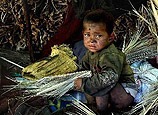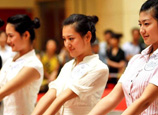
PARTNERS NOT RIVALS
Leaders of the two countries have repeatedly underscored their common pursuit of development and the principle that they are partners instead of rivals.
In their March meeting, Xi told Singh that the world needs the common development of China and India, and is big enough to accommodate the development of both countries.
China regards its ties with India as one of its most important bilateral relationships, and commits itself to pushing forward the two countries' strategic cooperative partnership, he added.
Singh said his country adheres to an independent foreign policy and will not be used as a tool to contain China.
India, he said, is willing to make concerted efforts with China to show the world that they are cooperative partners instead of rivals.
The Indian prime minister said his country recognizes Tibet as part of the Chinese territory and will not allow Tibetans to conduct political activities against China in India.
Shortly after Li became Chinese premier on March 15, Singh congratulated him over phone. During the conversation, Li said China will, as always, attach great importance to its relations with India and will work with India to further promote their strategic cooperative partnership.
People-to-people interaction is another important dimension of bilateral ties, and recent years have seen youth exchanges proceeding well between China and India.
While addressing an Indian youth delegation on Wednesday in Beijing, Li encouraged young people in China and India to draw wisdom and strength from the two countries' abundant historical traditions and actively promote bilateral friendly cooperation.
According to Jacob from the Institute of Chinese Studies, there is a lot of interest in learning the Chinese language in India. Similarly, many young Chinese are interested in Indian culture and dance.
"I think, there should be more scholarships related to these areas -- language and the creative arts -- between the two countries, so that young people on both sides can develop a deeper appreciation of each other," Jacob said.
Jacob also proposed that the two countries translate their famous literary works into each other's languages, saying that such efforts are vital to people-to-people exchanges.
China and India established diplomatic ties in April 1950. Despite some twists and turns, friendship and cooperation have prevailed through bilateral ties.
Considering their large population and rising international status, the world cannot afford a sour relationship between the two countries.
Meanwhile, the two nations have demonstrated that they are blazing a new trail for positive interaction toward win-win results. During the process, Li's maiden foreign tour will definitely inject new vigor to bilateral ties.

















 Short movies to make TV debut overseas
Short movies to make TV debut overseas


![]()
